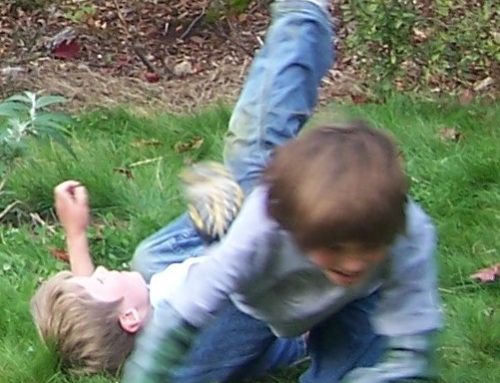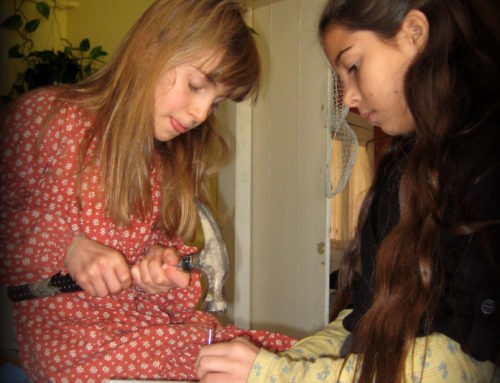I do a lot of wondering. A lot of wondering about kids and childhood and our current social construction of childhood, how it supports kids as unique beings in their learning and growing and becoming autonomous people, and how it might work better. What does it mean for kids to have rich, purposeful, engaged lives as part of their community and their society, not only when they grow up, but now, this very moment, at what ever age they are in what ever stage of learning and growing and becoming?
Segregation of kids from adults and the adult world
So often childhood is viewed as a preparation for life, for adulthood and independence, and over time children and childhood have been more and more segregated from adult life and society. We are at a point where there is little contact other than in official and hierarchical ways between adults and children and children have very little if any scope for meaningful participation in lager (adult) society.
When we segregate kids from adult society, mainly by sending them to school to interact mostly with only people their age, something is missing. Something is missing for kids and something is missing for adults: The opportunity for older and younger people, adults and children, to engage and interact in free ways with each other, to learn from and share with each other not only by pre-design but because lives are intertwined. For children to be involved in adults’ lives and to have adults in their lives, not just for their care, education or well being, but as friend, comrade, co-conspirator, play-mate, creates a whole different kind of dynamic and relationship.
Ben(25) and Sidney(4) are playing Legos again. They are both very into the things they are building, Ben just as much as Sidney. It’s a relationship based on mutual interest and enjoyment. All the kids are quite fond of Ben and he has a natural ease with them. A couple of times in the last couple days Sidney has said, “Ben, I love you” In this setting there is no obligation and friendship can develop between adults and children based solely on mutual interest and friendship and not on adult authority.
Adults and Kids Together….
I’ve often felt that kids need to be left alone more, to have more freedom, and less adult interference, to be able to learn, grow, discover and make mistakes and generally to live more on their own terms. In a way, I also think adults and children need each other. The kind of contact I am talking about is different than the typical hierarchical model where adults are responsible for, supervise and direct children- where there is an obviously hierarchical dynamic with adult as ultimate authority. What I’m talking about is adults as resources and mentors, as friends and playmates, as part of life and community and not as the authorities and deciders in kids’ lives. Kids need contact to interesting people doing interesting things that have something to share; people who, by virtue of their experience, knowledge, wisdom or character hold some natural authority and that kids want to listen to, spend time with and learn from. To have opportunities to participate and engage in meaningful ways in the lives of others, to be around a diversity of activity and interest, a culture of people of diverse ages living and navigating their lives.
So much is to be learned from this. Sharing with people at a different/greater level of skill, knowledge and ability gives children a sense of things they would not otherwise experience or understand. Children integrated in community, in age-diverse culture, gives children an idea of where they are going, what it might mean to live a meaningful adult life, to see how people live and respond to life, how they address life phases and challenges and examples of how to explore, navigate, communicate and live. It gives exposure to all manner of activities, ideas, perspectives and understanding of life that would otherwise not be available. It also gives children a space for experience and understanding of adult life, culture and structure and chances to participate and learn to navigate in this world as they grow into adulthood themselves.
What would it be like if kids had an integrated place in life that is connected to community and society, and were not so severely segregated through school and nuclear family? It seems that school, which is the predominant experience for children, and the general cultural construction of childhood in American society is missing the larger culture… there is not an adult culture or society in which to participate, to engage, to be involved, to offer one’s perspective and there is limited scope to learn from others at quite different stages of life except in hierarchical ways. A supportive environment and community with people of all ages, can enhance children’s autonomy and freedom in ways impossible to achieve in nuclear family, or even in a school. I believe that the complexity and wealth of knowledge, learning, resources and experience available through diverse and rich cultural environments, with people of varied life experience, knowledge and skill, in which people interact and share ideas can never be reproduced in a classroom. There are countless things I’ve learned not because I was taught them, but because I grew up around them, because they were part of my community and culture that I learned through experiencing and witnessing. The power of learning that happens through culture and relationship is invaluable.
Adults need children and young people equally as much as children need them… To remind them to look at the world in new ways, to offer fresh perspective, to play. Adults need meaningful mutually respectful relationships with children as a means toward understanding the future, to bring fresh energy, to inspire. To learn compassion and caring, to nurture, to remember how to be authentic, curious, real. To impart their knowledge and wisdom so that it can be carried forth to future generations. I think a lot of adults feel uncomfortable around kids- perhaps for lack of contact- and being in shared environments with kids helps decrease this alienation and discomfort.
Rebuilding Age-integrated Community and Culture
In some ways this is an old concept. Children were once much more integrated into society and culture, and indeed, in other cultures, still are. I think it has a value that we have been rapidly loosing over the last century.
The spaces I have seen that give adults and children opportunities to interact with and engage with each other in free ways are often community types of settings, where groups of people gather or interact with each other and kids are included, or at least not excluded and are in the same spaces and environments as adults. The best examples I can think of, at least that create this sort of meeting place in an on-going way, are Intentional Communities in which people regularly share space and activities. A well connected neighborhood where parents as well as children spend time together could provide a similar environment and culture. There are other places as well, such as the family summer camp where I work. While it provides a similar experience for the adults and children to come together, it is not as long lasting, or as much of a way of life.
My sincere wish and deep yearning is to see the values of respect and care for children that we have grown into more fully in the last few generations, and the more age integrated and inclusive culture that in some ways we have historically had, find a meeting ground. I want to see a place where children have voice, power and freedom and are also interwoven into a larger culture of interesting people doing interesting things with their lives. A place where true friendships between adults and children can form. Friendships based on mutual desire, joy and interest, freely chosen by both adult and child without sense of duty or obligation.
Some Thoughts and questions to explore:
What sorts of friendships to you have with younger or older people in your life? How might you go about including children and young people more, not just by hanging out but in life and life activity? When you were a kid did you interact with people of lots of different ages, were you allowed to participate with adults in activities or did you participate mostly in activities designed especially for children? Please leave a comment below!:


Thanks Elana for this post. This is a topic near and dear to my heart and was the focus of my dissertation some 20 years ago. I agree that intentional communities are potentially wonderful places for children to integrate into the adult world (and v.v.) and I see a lot of that happen naturally around Sirius, where we live with our two daughters. It’s also true that most people who live in such communities did not grow up in them themselves and so there is a lot of “unlearning” that needs to happen in order for the culture to shift. I believe that when it works well, the informal education that children gain by participating in community far outweighs any formal education they receive in school.